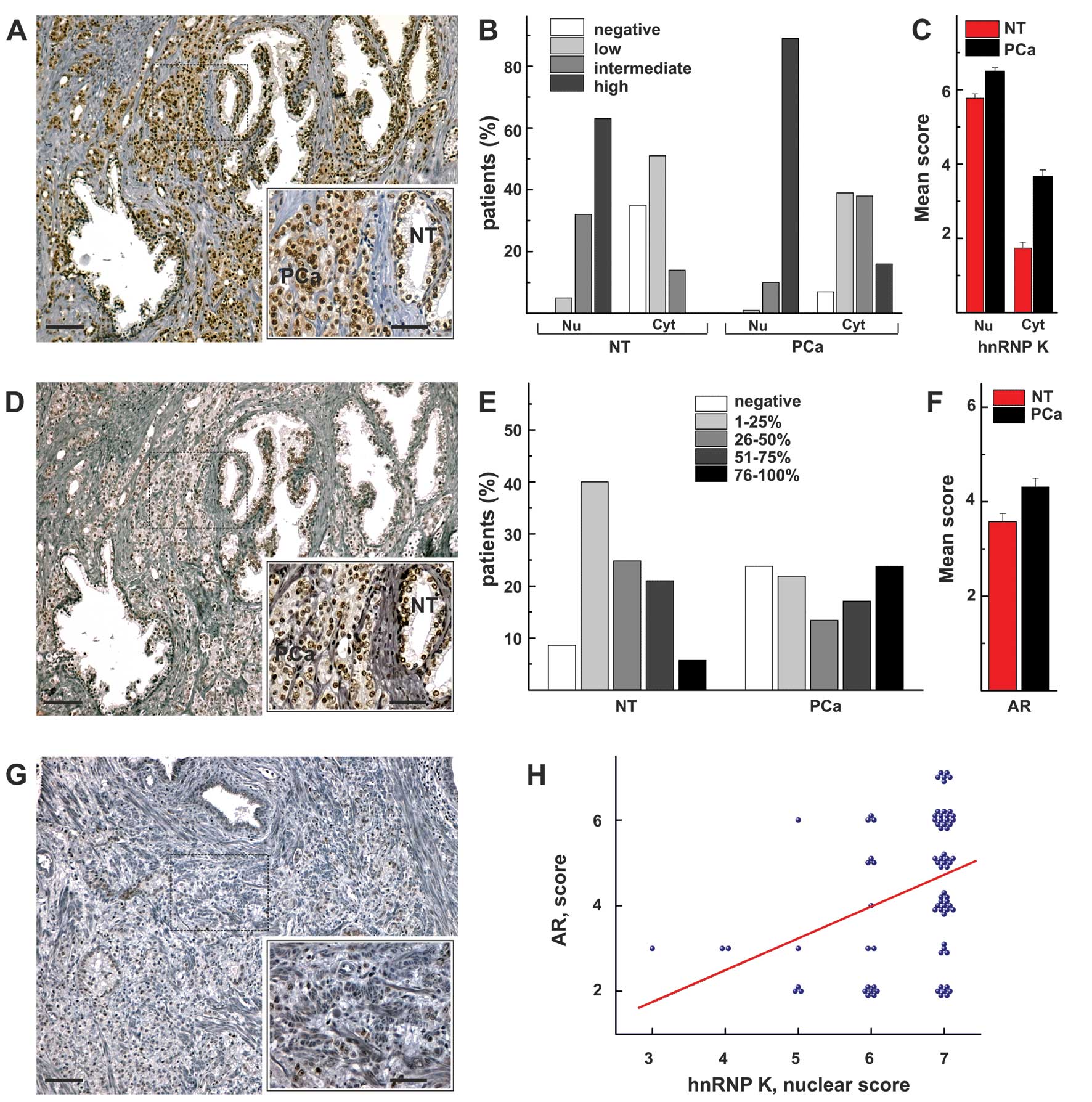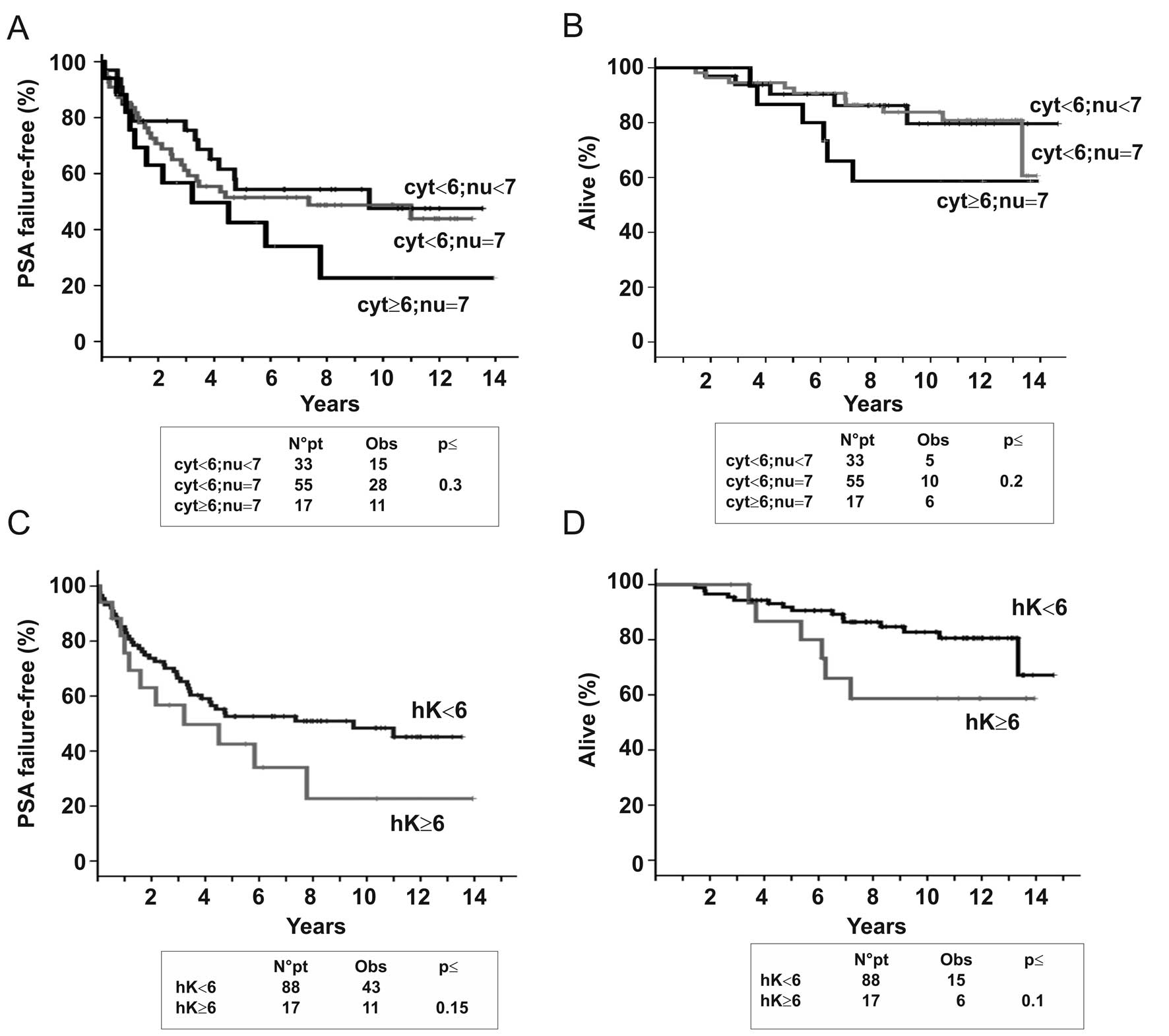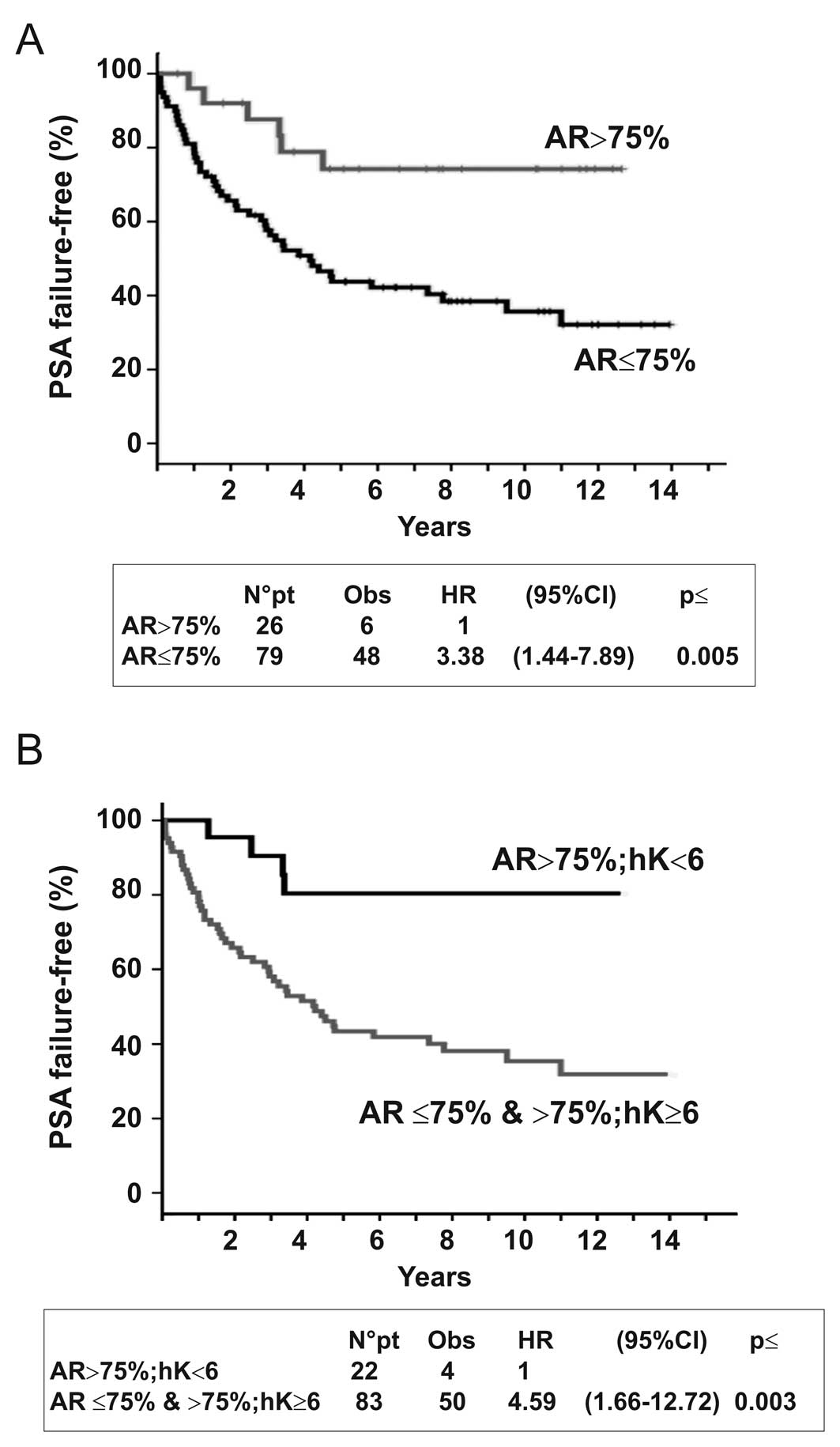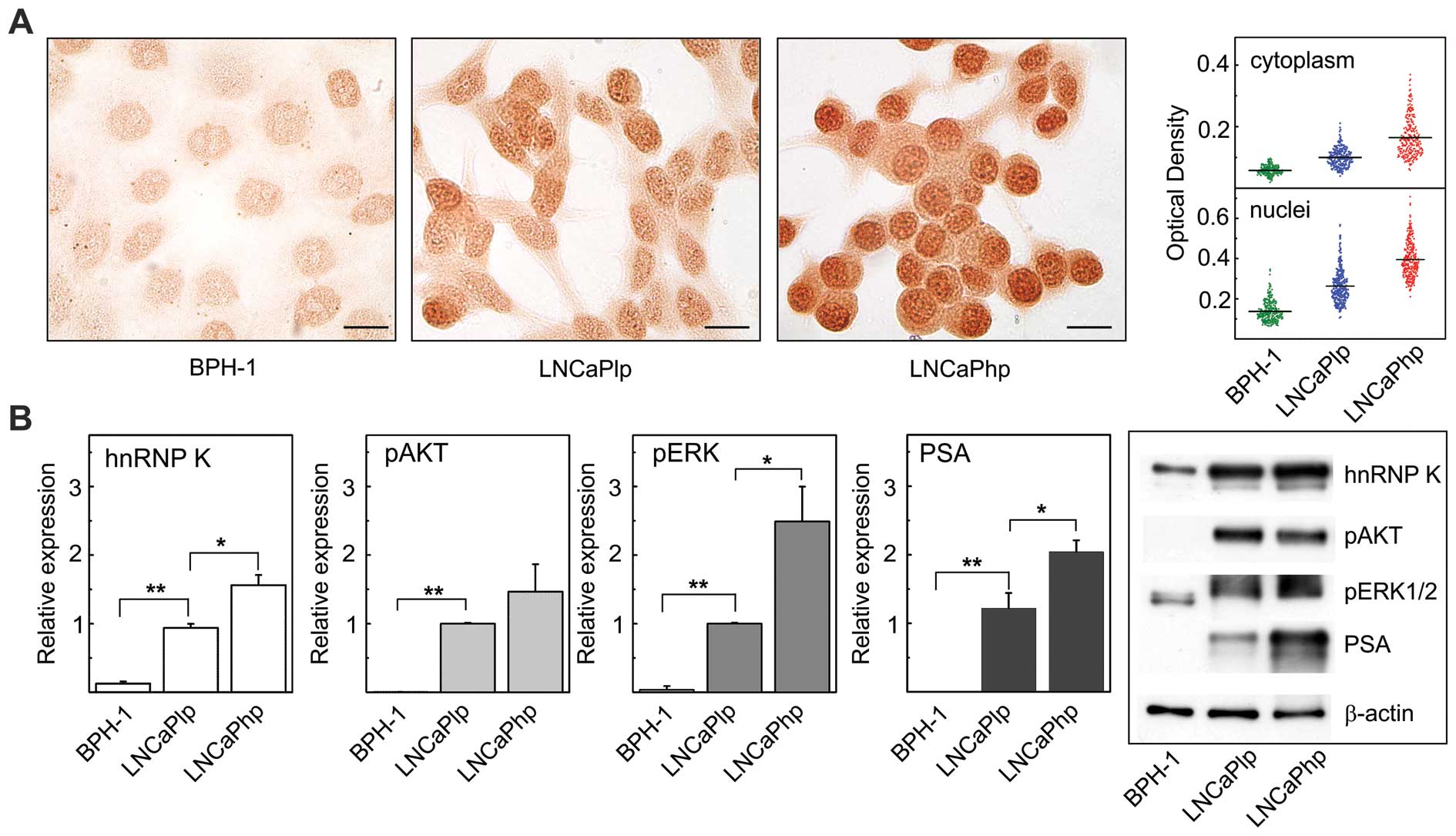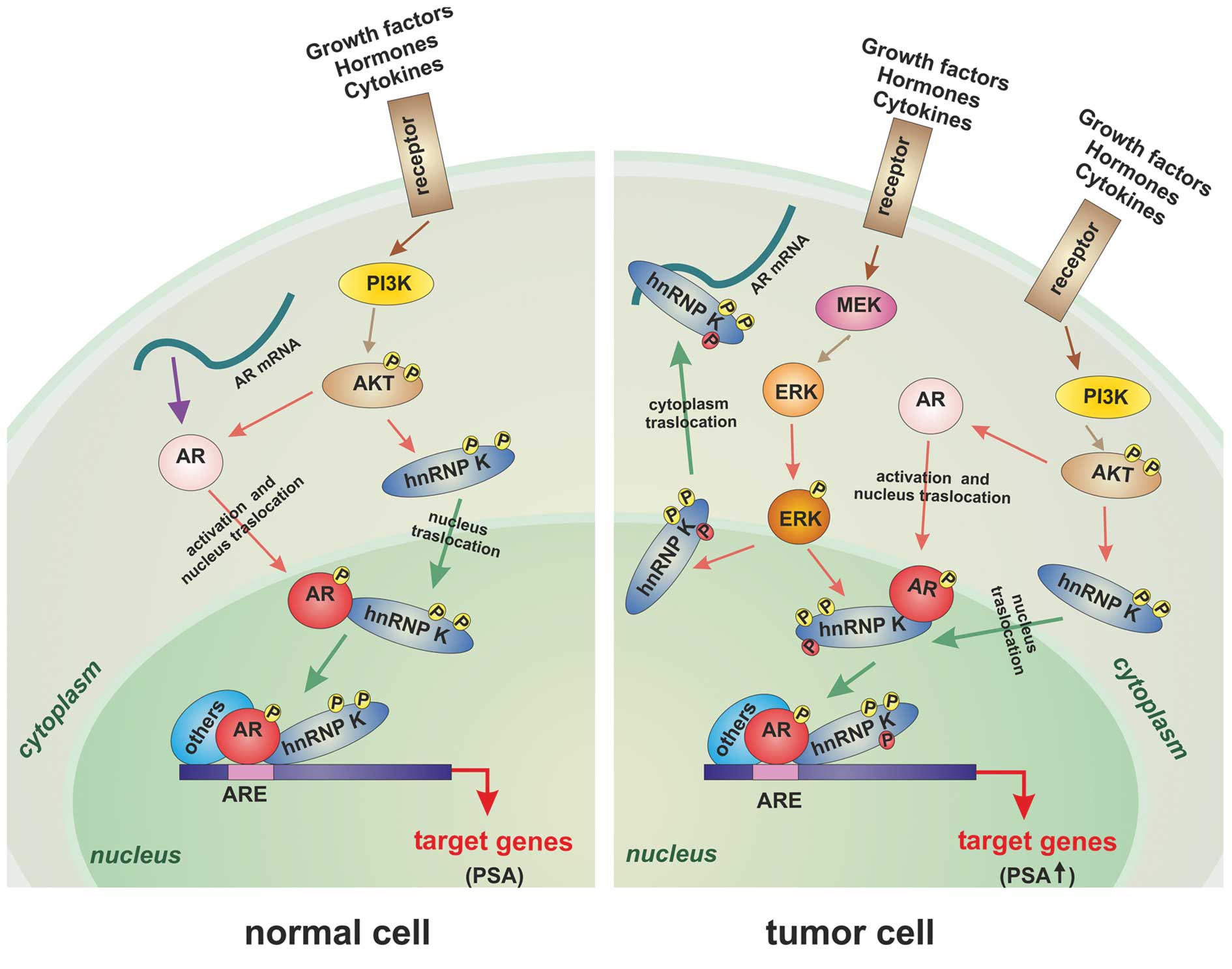|
1.
|
Siegel R, Naishadham D and Jemal A: Cancer
statistics, 2012. CA Cancer J Clin. 62:10–29. 2012. View Article : Google Scholar
|
|
2.
|
Stamey TA: Preoperative serum
prostate-specific antigen (PSA) below 10 μg/l predicts
neither the presence of prostate cancer nor the rate of
postoperative PSA failure. Clin Chem. 47:631–634. 2001.PubMed/NCBI
|
|
3.
|
Bostwick DG, Grignon DJ, Hammond ME, Amin
MB, Cohen M, Crawford D, Gospadarowicz M, Kaplan RS, Miller DS,
Montironi R, Pajak TF, Pollack A, Srigley JR and Yarbro JW:
Prognostic factors in prostate cancer. College of American
Pathologists Consensus Statement 1999. Arch Pathol Lab Med.
124:995–1000. 2000.PubMed/NCBI
|
|
4.
|
Humphrey PA and Vollmer RT: Percentage
carcinoma as a measure of prostatic tumor size in radical
prostatectomy tissues. Mod Pathol. 10:326–333. 1997.PubMed/NCBI
|
|
5.
|
Tefilli MV, Gheiler EL, Tiguert R, Sakr W,
Grignon DJ, Banerjee M, Pontes JE and Wood DP Jr: Should Gleason
score 7 prostate cancer be considered a unique grade category?
Urology. 53:372–377. 1999. View Article : Google Scholar : PubMed/NCBI
|
|
6.
|
Montironi R, Mazzuccheli R, Scarpelli M,
Lopez-Beltran A, Fellegara G and Algaba F: Gleason grading of
prostate cancer in needle biopsies or radical prostatectomy
specimens: contemporary approach, current clinical significance and
sources of pathology discrepancies. BJU Int. 95:1146–1152.
2005.
|
|
7.
|
Mukhopadhyay NK, Kim J, Cinar B,
Ramachandran A, Hager MH, Di Vizio D, Adam RM, Rubin MA,
Raychaudhuri P, De Benedetti A and Freeman MR: Heterogeneous
nuclear ribonucleoprotein K is a novel regulator of androgen
receptor translation. Cancer Res. 69:2210–2218. 2009. View Article : Google Scholar : PubMed/NCBI
|
|
8.
|
Barboro P, Repaci E, Rubagotti A, Salvi S,
Boccardo S, Spina B, Truini M, Introini C, Puppo P, Ferrari N,
Carmignani G, Boccardo F and Balbi C: Heterogeneous nuclear
ribonucleo-protein K: altered pattern of expression associated with
diagnosis and prognosis of prostate cancer. Br J Cancer.
100:1608–1616. 2009. View Article : Google Scholar
|
|
9.
|
Bomsztyk K, Denisenko O and Ostrowski J:
hnRNP K: one protein multiple processes. Bioessays. 26:629–638.
2004. View Article : Google Scholar : PubMed/NCBI
|
|
10.
|
Ostrowski J and Bomsztyk K: Nuclear shift
of hnRNP K protein in neoplasms and other states of enhanced cell
proliferation. Br J Cancer. 89:1493–1501. 2003. View Article : Google Scholar : PubMed/NCBI
|
|
11.
|
Carpenter B, MacKay C, Alnabulsi A, MacKay
M, Telfer C, Melvin WT and Murray GI: The roles of heterogeneous
nuclear ribonucleoproteins in tumour development and progression.
Biochim Biophys Acta. 1765:85–100. 2006.PubMed/NCBI
|
|
12.
|
Carpenter B, McKay M, Dundas SR, Lawrie
LC, Telfer C and Murray GI: Heterogeneous nuclear ribonucleoprotein
K is over expressed, aberrantly localized and is associated with
poor prognosis in colorectal cancer. Br J Cancer. 95:921–927. 2006.
View Article : Google Scholar : PubMed/NCBI
|
|
13.
|
Chen LC, Hsueh C, Tsang NM, Liang Y, Chang
KP, Hao SP, Yu JS and Chang YS: Heterogeneous nuclear
ribonucleoprotein K and thymidine phosphorylase are independent
prognostic and therapeutic markers for nasopharyngeal carcinoma.
Clin Cancer Res. 14:3807–3813. 2008. View Article : Google Scholar
|
|
14.
|
Matta A, Tripathi SC, DeSouza LV, Grigull
J, Kaur J, Chauhan SS, Srivastava A, Thakar A, Shukla NK, Duggal R,
DattaGupta S, Ralhan R and Siu KWM: Heterogeneous ribonucleoprotein
K is a marker of oral leukoplakia and correlates with poor
prognosis of squamous cell carcinoma. Int J Cancer. 125:1398–1406.
2009. View Article : Google Scholar
|
|
15.
|
Chen LC, Chung IC, Hsueh C, Tsang NM, Chi
LM, Liang Y, Chen CC, Wang LJ and Chang YS: The antiapoptotic
protein FLIP, is regulated by heterogeneous nuclear
ribonucleoprotein K and correlates with poor overall survival of
nasopharyngeal carcinoma patients. Cell Death Differ. 17:1463–1473.
2010. View Article : Google Scholar : PubMed/NCBI
|
|
16.
|
Wen F, Shen A, Shanas R, Bhattacharyya A,
Lian F, Hostetter G and Shi J: Higher expression of the
heterogeneous nuclear ribonucleoprotein K in melanoma. Ann Surg
Oncol. 17:2619–2627. 2010. View Article : Google Scholar : PubMed/NCBI
|
|
17.
|
Hope NR and Murray GI: The expression
profile of RNA-binding proteins in primary and metastatic
colorectal cancer: relationship of heterogeneous nuclear
ribonucleoproteins with prognosis. Human Pathol. 42:392–402.
2011.
|
|
18.
|
Wang F, Zhang P, Shi C, Yang Y and Qin H:
Immunohisto-chemical detection of HSP27 and hnRNP K as prognostic
and predictive biomarkers for colorectal cancer. Med Oncol.
29:1780–1788. 2012. View Article : Google Scholar : PubMed/NCBI
|
|
19.
|
Nagano K, Masters JR, Akpan A, Yang A,
Corless S, Wood C, Hastie C, Zvelebil M, Cramer R and Naaby-Hansen
S: Differential protein synthesis and expression levels in normal
and neoplastic human prostate cells and their regulation by type I
and II interferons. Oncogene. 23:1693–1703. 2004. View Article : Google Scholar : PubMed/NCBI
|
|
20.
|
Wang LG, Johnson EM, Kinoshita Y, Babb JS,
Buckley MT, Liebes LF, Melamed J, Liu XM, Kurek R, Ossowski L and
Ferrari AC: Androgen receptor overexpression in prostate cancer
linked to Purα loss from a novel repressor complex. Cancer Res.
68:2678–2688. 2008.
|
|
21.
|
Boccardo F, Rubagotti A, Carmignani G,
Romagnoli A, Nicolò G, Barboro P, Parodi S, Patrone E and Balbi C:
Nuclear matrix proteins changes in cancerous prostate tissues and
their prognostic value in clinically localized prostate cancer.
Prostate. 55:259–264. 2003. View Article : Google Scholar
|
|
22.
|
Ricci F, Rubagotti A, Zinoli L, Mangerini
R, Nuzzo PV, Carmignani G, Simonato A, Barboro P, Balbi C and
Boccardo F: Prognostic value of nuclear matrix protein expression
in localized prostate cancer. J Cancer Res Clin Oncol.
138:1379–1384. 2012. View Article : Google Scholar : PubMed/NCBI
|
|
23.
|
Barboro P, Repaci E, Ferrari N, Rubagotti
A, Boccardo F and Balbi C: Androgen receptor and heterogeneous
nuclear ribonucleoprotein K colocalize in the nucleoplasm and are
modulated by bicalutamide and 4-hydroxy-tamoxifen in prostatic
cancer cell lines. Prostate. 71:1466–1479. 2011. View Article : Google Scholar : PubMed/NCBI
|
|
24.
|
Igawa T, Lin FF, Lee MS, Karan D, Batra SK
and Lin MF: Establishment and characterization of
androgen-independent human prostate cancer LNCaP cell model.
Prostate. 50:222–235. 2002. View Article : Google Scholar : PubMed/NCBI
|
|
25.
|
Tepper CG, Boucher DL, Ryan PE, Ma AH, Xia
L, Lee LF, Pretlow TG and Kung HJ: Characterization of a novel
androgen receptor mutation in a relapsed CWR22 prostate cancer
xenograft and cell line. Cancer Res. 62:6606–6614. 2002.PubMed/NCBI
|
|
26.
|
Barboro P, Rubagotti A, Orecchia P, Spina
B, Truini M, Repaci E, Carmignani G, Romagnoli A, Introini C,
Boccardo F, Carnemolla B and Balbi C: Differential proteomic
analysis of nuclear matrix in muscle-invasive bladder cancer:
potential to improve diagnosis and prognosis. Cell Oncol. 30:13–26.
2008.
|
|
27.
|
Kim D, Gregory CW, Smith GJ and Mohler JL:
Immunohistochemical quantitation of androgen receptor expression
using color video image analysis. Cytometry. 35:2–10. 1999.
View Article : Google Scholar : PubMed/NCBI
|
|
28.
|
Fleiss JL: Statistical Methods for Rates
and Proportions. 2nd edition. John Wiley & Sons, Inc; New York:
1981
|
|
29.
|
Kaplan EL and Meier P: Nonparametric
estimation from incomplete observations. J Am Stat Assoc.
53:457–481. 1958. View Article : Google Scholar
|
|
30.
|
Cox DR: Regression models and life tables.
JR Stat Soc B. 34:187–220. 1972.
|
|
31.
|
Armitage P, Berry G and Matthews JNS:
Statistical methods in Medical Research. 4th edition. Blackwell
Publishing; Oxford: 2000
|
|
32.
|
Heinlein CA and Chang C: Androgen receptor
in prostate cancer. Endocr Rev. 25:276–308. 2004. View Article : Google Scholar : PubMed/NCBI
|
|
33.
|
Mohler JM: A role for the
androgen-receptor in clinically localized and advanced prostate
cancer. Best Pract Res Clin Endocrinol Metab. 22:357–372. 2008.
View Article : Google Scholar : PubMed/NCBI
|
|
34.
|
Habelhah H, Shah K, Huang L,
Ostareck-Lederer A, Burlingame AL, Shokat KM, Hentze MW and Ronai
Z: ERK phosphorylation drives cytoplasmic accumulation of hnRNP-K
and inhibition of mRNA translation. Nat Cell Biol. 3:325–330. 2001.
View Article : Google Scholar : PubMed/NCBI
|
|
35.
|
Hong SK, Jeong JH, Chan AM and Park JI:
AKT upregulates B-Raf Ser445 phosphorylation and ERK1/2 activation
in prostate cancer cells in response to androgen depletion. Exp
Cell Res. 319:1732–1743. 2013. View Article : Google Scholar : PubMed/NCBI
|
|
36.
|
Fiorentino M, Capizzi E and Loda M: Blood
and tissue biomarkers in prostate cancer: State of the art. Urol
Clin North Am. 37:131–141. 2010. View Article : Google Scholar : PubMed/NCBI
|
|
37.
|
Sadi M and Barrack ER: Image analysis of
androgen receptor immunostaining in metastatic prostate cancer.
Heterogeneity as a predictor of response to hormonal therapy.
Cancer. 71:2574–2580. 1993. View Article : Google Scholar
|
|
38.
|
Magi-Galluzzi C, Xu X, Hlatky L, Hahnfeldt
P, Kaplan I, Hsiao P, Chang C and Loda M: Heterogeneity of androgen
receptor content in advanced prostate cancer. Mod Pathol.
10:8398–8445. 1997.
|
|
39.
|
Mikula M and Ostrowski J: HNRNP K
(heterogeneous nuclear ribonucleoprotein K). Atlas Genet Cytogenet
Oncol Haematol. 14:127–129. 2010.
|
|
40.
|
Shi L, Ko S, Kim S, Echchgadda I, Oh TS,
Song CS and Chatterjee B: Loss of androgen receptor in aging and
oxidative stress through Myb protooncoprotein-regulated reciprocal
chromatin dynamics of p53 and poly(ADP-ribose) polymerase PARP-1. J
Biol Chem. 283:36474–36485. 2008. View Article : Google Scholar : PubMed/NCBI
|
|
41.
|
Inoue A, Sawata SY, Taira K and Wadhwa R:
Loss-of-function screening by randomized intracellular antibodies:
identification of hnRNP-K as a potential target for metastasis.
Proc Natl Acad Sci USA. 104:8983–8988. 2007. View Article : Google Scholar
|
|
42.
|
Benelli R, Monteghirfo S, Balbi C, Barboro
P and Ferrari N: Novel antivascular efficacy of metronomic
docetaxel therapy in prostate cancer: hnRNP K as a player. Int J
Cancer. 124:2989–2996. 2009. View Article : Google Scholar : PubMed/NCBI
|
|
43.
|
Paliouras M, Zaman N, Lumbroso R,
Kapogeorgakis L, Beitel LK, Wang E and Trifiro M: Dynamic rewiring
of the androgen receptor protein interaction network correlates
with prostate cancer clinical outcomes. Integr Biol. 3:1020–1032.
2011. View Article : Google Scholar : PubMed/NCBI
|
|
44.
|
Chmelar R, Buchanan G, Need EF, Tilley W
and Greenberg NM: Androgen receptor coregulators and their
involvement in the development and progression of prostate cancer.
Int J Cancer. 120:719–733. 2007. View Article : Google Scholar : PubMed/NCBI
|
|
45.
|
Barboro P, Borzì L, Repaci E, Ferrari N
and Balbi C: Androgen Receptor activity is affected by both nuclear
matrix localization and the phosphorylation status of the
heterogeneous nuclear ribonucleoprotein K in anti-androgen-treated
LNCaP cells. PLoS One. 8:e792122013. View Article : Google Scholar
|
|
46.
|
McCubrey JA, Steelman LS, Chappell WH,
Abrams SL, Wong EW, Chang F, Lehmann B, Terrian DM, Milella M,
Tafuri A, Stivala F, Libra M, Basecke J, Evangelisti C, Martelli AM
and Franklin RA: Roles of the Raf/MEK/ERK pathway in cell growth,
malignant transformation and drug resistance. Biochim Biophys Acta.
1773:1263–1284. 2007. View Article : Google Scholar : PubMed/NCBI
|
|
47.
|
Ciarlo M, Benelli R, Barbieri O, Minghelli
S, Barboro P, Balbi C and Ferrari N: Regulation of neuroendocrine
differentiation by AKT/hnRNPK/AR/β-catenin signaling in prostate
cancer cells. Int J Cancer. 131:582–590. 2012.PubMed/NCBI
|
|
48.
|
Gao R, Yu Y, Inoue A, Widodo N, Kaul SC
and Wadhwa R: Heterogeneous nuclear ribonucleoprotein K (hnRNP-K)
promotes tumor metastasis by induction of genes involved in
extracellular matrix, cell movement, and angiogenesis. J Biol Chem.
288:15046–15056. 2013. View Article : Google Scholar : PubMed/NCBI
|















